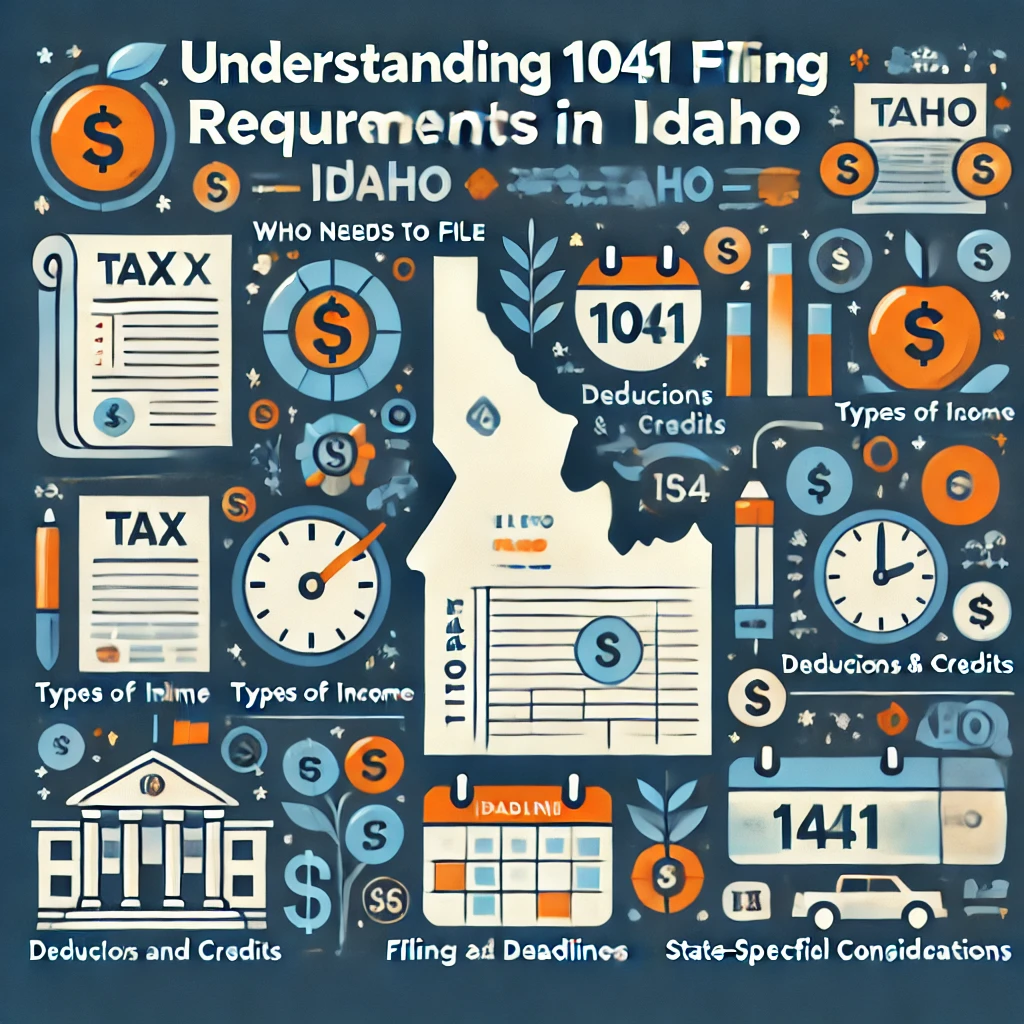Filing taxes can be a complex process, especially when it involves estates and trusts. In Idaho, as in other states, the Internal Revenue Service (IRS) Form 1041, also known as the U.S. Income Tax Return for Estates and Trusts, is a crucial document for fiduciaries managing estates and trusts. This blog aims to provide a comprehensive understanding of the 1041 filing requirements in Idaho, ensuring that fiduciaries are well-prepared to meet their tax obligations.
What is IRS Form 1041?
IRS Form 1041 is used to report income, deductions, gains, and losses of estates and trusts, as well as to calculate the income tax liability of these entities. The fiduciary, who could be an executor, administrator, or trustee, is responsible for filing this form. The form is similar to an individual income tax return but is specifically designed for estates and trusts.
Who Needs to File Form 1041 in Idaho?
In Idaho, as elsewhere, the filing requirements for Form 1041 depend on several factors:
- Gross Income Threshold: If an estate or trust has gross income of $600 or more during the tax year, it must file Form 1041.
- Beneficiary Status: If any beneficiary is a non-resident alien, the estate or trust must file Form 1041, regardless of the income amount.
- Specific Types of Trusts: Certain trusts, such as charitable trusts and pooled income funds, have distinct filing requirements.
Types of Income Reported on Form 1041
Form 1041 covers various types of income that an estate or trust might receive, including:
- Interest Income: Earnings from savings accounts, CDs, and other interest-bearing accounts.
- Dividends: Income from stocks and mutual funds.
- Rental Income: Earnings from rental properties.
- Capital Gains: Profits from the sale of assets like stocks, bonds, and real estate.
- Business Income: Revenue from any business activities the estate or trust engages in.
Deductions and Credits on Form 1041
Just like individual taxpayers, estates and trusts can also claim deductions and credits to reduce their taxable income. Some common deductions include:
- Administrative Expenses: Costs related to managing the estate or trust, such as legal fees, accounting fees, and executor or trustee fees.
- Distribution Deductions: Amounts distributed to beneficiaries can often be deducted, reducing the taxable income of the estate or trust.
- Charitable Contributions: Donations made to qualifying charitable organizations.
- Taxes Paid: State and local taxes paid by the estate or trust.
Filing Deadlines and Extensions
The deadline for filing Form 1041 is the 15th day of the 4th month following the close of the tax year. For estates and trusts operating on a calendar year, this means the filing deadline is April 15. If additional time is needed, an extension can be requested using Form 7004, which grants an automatic 5.5-month extension for most estates and trusts.
State-Specific Considerations in Idaho
While Form 1041 is a federal tax form, fiduciaries must also consider state tax obligations. In Idaho, estates and trusts may need to file an Idaho Fiduciary Income Tax Return (Form 66) if they have income from Idaho sources. Key points to note include:
- Idaho Source Income: This includes income from real estate located in Idaho, business income from activities conducted in Idaho, and income from Idaho-based partnerships or S-corporations.
- Filing Thresholds: Estates and trusts must file an Idaho Form 66 if they have Idaho source income and their gross income meets or exceeds the federal filing requirement.
- Tax Rates: Idaho imposes a graduated income tax on estates and trusts, similar to the rates applied to individual taxpayers.
Preparing to File Form 1041
Filing Form 1041 requires careful preparation and accurate documentation. Here are some steps to ensure a smooth filing process:
- Gather Documentation: Collect all relevant financial documents, including bank statements, investment reports, and records of any income received by the estate or trust.
- Calculate Income and Deductions: Accurately calculate the total income earned by the estate or trust and identify any applicable deductions.
- Complete the Form: Fill out Form 1041, providing detailed information about income, deductions, and distributions to beneficiaries.
- File the Return: Submit the completed form to the IRS by the filing deadline. If necessary, file Form 7004 to request an extension.
Common Mistakes to Avoid
Filing Form 1041 can be complex, and fiduciaries should be aware of common mistakes that could lead to issues with the IRS:
- Incomplete Information: Ensure that all required fields are filled out completely and accurately.
- Incorrect Calculations: Double-check all calculations to avoid errors in reporting income and deductions.
- Missing Deadlines: Be mindful of filing deadlines and request extensions if needed to avoid late filing penalties.
- Failing to Report All Income: Ensure that all sources of income are reported, even if they seem minor.
Seeking Professional Assistance
Given the complexity of Form 1041 and the potential consequences of errors, many fiduciaries choose to seek professional assistance. Tax professionals, including CPAs and tax attorneys, can provide valuable guidance and ensure that the return is filed correctly. They can also help with estate planning and the administration of trusts, ensuring compliance with both federal and state tax laws.
Conclusion
Understanding the 1041 filing requirements in Idaho is crucial for fiduciaries managing estates and trusts. By being aware of the income thresholds, types of income, deductions, and deadlines, fiduciaries can ensure they meet their tax obligations and avoid potential penalties. While the process can be complex, thorough preparation and professional assistance can make it manageable. Whether you’re a new fiduciary or have years of experience, staying informed about the latest tax requirements will help you fulfill your responsibilities effectively.
In summary, the 1041 filing process in Idaho involves reporting various types of income, claiming applicable deductions, and meeting both federal and state tax obligations. With careful attention to detail and proper documentation, fiduciaries can navigate this process successfully and ensure compliance with all relevant tax laws.



